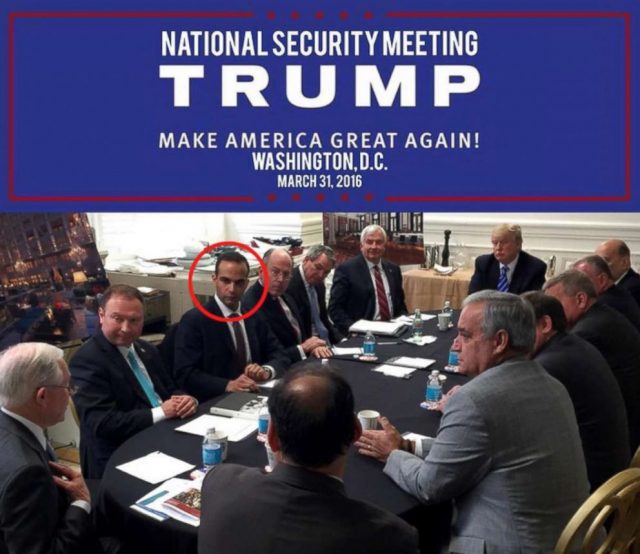
He is a fake president trying to force his authoritarian fake reality upon the nation.
By Dan Peak
The Commoner Call (11/6/17)
Dear Fellow Readers,
David Roberts of Vox poses an excellent question, “what if Mueller proves his case and it doesn’t matter?”. Greg Sargent of The Washington Post offers the same concern as he addresses the real risk we face with Trump and Trump-Russia collusion: New Reporting Deals Another Big Blow To Trump’s Dangerous Russia Spin.
“… that the alleged Russian sabotage itself, irrespective of whether his (Trump) campaign colluded with it, definitively never happened at all and, by extension, doesn’t merit any inquiry or discussion.”
If we don’t address what happened and fix the things that allowed it to happen we will repeat the mistakes made and we will have earned the authoritarian government we allowed – by design or neglect.
Vox perfectly captures our moment in time with Trump-Russia collusion.
Why We Pretend To Know Things, Explained By A Cognitive Scientist: According to Steven Sloman, a professor of cognitive science at Brown University, how each of us feels about Trump-Russia is a reflection of our social surroundings. He shares a comment that underscores the point:
“As much as I hate hearing Trump lie, I get even crazier when I see that 44 percent of the American population put more faith in his words than in the mainstream media.”
This also from Sloman:
“The decisions we make, the attitudes we form, the judgments we make, depend very much on what other people are thinking.”
Sloman offers these insights:
- We have a “tendency to overestimate our understanding of how the world works”
- “We’re biased to preserve our sense of rightness,”…
- If the people around us are wrong about something, there’s a good chance we will be too
- He thinks the rise of “fake news” and “alternative facts” has amplified our cognitive biases
A very powerful influence on us will be how the people around us feel about an issue.
Post-ABC Poll: Most Americans Approve Of Trump-Russia Probe, And Nearly Half Think Trump Committed A Crime: Polling results from a Washington Post-ABC News Poll conducted between Oct. 29 and Nov. 1 show:
49% say it is “likely” Trump himself committed a crime.
58% say approve of special counsel Robert Mueller’s handling of the investigation.
53% say Manafort and Papadopoulos indictments represent broader wrongdoing.
This poll seems to show a growing acceptance of the idea that Trump did commit a crime and our news daily confirms patterns of broader wrongdoing by the Trump campaign.
But 49% saying it is “likely” Trump committed a crime still reflects that we are of two divided camps and encouraged to move from one to the other or stay where we are for political benefit. If you look at the detailed view of the survey results we see that conservative Republicans disapprove of the way Mueller is handling the investigation (32% approve vs. 47% disapprove) while Liberal Democrats approve (83% approve vs. 11% disapprove).
If there are two divergent camps, how might this split matters? Might Mueller prove Trump is guilty of collusion and yet it nothing happens?
Vox raises the unsettling possibility: America Is Facing An Epistemic Crisis: What If Mueller Proves His Case And It Doesn’t Matter?
Let’s look to neuro-science for insight with the Trump-Russia collusion equivalent of ‘smoking causes cancer – true or false?’:
“Epistemology is the branch of philosophy having to do with how we know things and what it means for something to be true or false, accurate or inaccurate. (Episteme, or ἐπιστήμη, is ancient Greek for knowledge/science/understanding.)
“The US is experiencing a deep epistemic breach, a split not just in what we value or want, but in who we trust, how we come to know things, and what we believe we know — what we believe exists, is true, has happened and is happening.
“The primary source of this breach, to make a long story short, is the US conservative movement’s rejection of the mainstream institutions devoted to gathering and disseminating knowledge (journalism, science, the academy) — the ones society has appointed as referees in matters of factual dispute.”
People like Sean Hannity and his employer Fox News, are selling a false equivalency and that is dangerous. It’s dangerous because it makes an opening for Neo-Nazis to march in Charlottesville. It’s dangerous because it fosters incidents like “Pizzagate”, where a gullible loner carries a semi-automatic assault weapon into a Washington, DC pizza joint to resolve a completely fictitious child prostitution ring.
It’s dangerous because as the right wing peddles alternative facts they also undermine trusted institutions and our faith in law – and even reality – with a goal of clearing the way to become their own rule of law and the only source of truth; to become the brutal authoritarians in charge.
Let’s use a Friday news item from Vox regarding Attorney General Jeffrey Beauregard Sessions III as an example: Jeff Sessions’s Russia Testimony Problem Keeps Getting Worse.
We keep learning that the attorney general of the United States hasn’t told the full story.
The Vox article includes the image below from a then-candidate Donald Trump, tweet from March 31, 2017. On one end of the table is Trump then foreign policy team Jefferson Sessions Beauregard III, then senator from Alabama, and on the other end of the table is candidate Donald Trump. Seated facing the camera, two persons to the left of Sessions, is foreign policy adviser George Papadopoulos.
The problem for Sessions is that he has repeatedly testified under oath to his former colleagues in the senate that he had no knowledge of inappropriate Trump campaign contact with Russians.
Here’s an on-the record comment from J. D. Gordon, Trump campaign Director of National Security, serving under Sesssions, about what happened during the meeting:
“GORDON: At that meeting, everybody had a chance to brief Mr. Trump for about 5 minutes on a topic within their area of expertise. So George goes after me, he introduces himself as George Papadopoulos, who works in the energy sector. He thanked Mr. Trump for having him on the campaign. And then he said, I can introduce you to President Putin.
“So there’s a discussion at the table. And Sen. Sessions shut down that discussion because it was a bad idea. And he said, I’d prefer if no one ever speaks about this again. And frankly I thought that was the end of it. Sen. Sessions thought it was the end of it.”
There are at least two ways to react to this statement. One view is this is yet another example of how Sessions and Trump have had to walk back their denials, admitting to Trump-Russia contact and communication. Or, as Trump defenders might argue, this is a meaningless contribution from a low-level volunteer that was immediately shut down by Sessions.
Sloman says that how each of us feels about that statement is a reflection of our social surroundings, so we should look around us.
Additionally, here’s how Trump strives to shape our views to align with his efforts to impose authoritarianism.
TRUMP: ‘The saddest thing’ is that I’m not supposed to influence the Justice Department and FBI.”
There has been much commentary this past week, including from former presidents, about whether Trump knows what his job is or how to do it. Didn’t we design our government to have enough checks and balances to protect democracy? Should we be worried when Trump says:
“I am not supposed to be doing the kind of things that I would love to be doing,” he said. “And I am very frustrated by it.”
We see routinely see this desire by Trump to overstep the bounds of his office.
As reported in Slate last Friday (11/3), this authoritarian attitude has spread to the Justice Department under the leadership of Sessions, who apparently agrees with his boss: The Justice Department Declares War On Attorneys Who Dare To Oppose The Trump Administration.
The story is worthy of taking the time to read but more importantly – there are handfuls of these kinds of stories, and worse, popping up every day in the news. Trump spent the last few days venting his anger and fuming frustration about how, for some reason, he can’t dictate the focus of the Department of Justice and the FBI. Here’s a second example from The Washington Post: Trump Breaches Boundaries By Saying DOJ Should Be ‘going after’ Democrats.
Trump fights his battles every day. He is up before dawn firing off volleys of fiery tweets, clawing for our hearts and minds. He is a fake president trying to force his authoritarian fake reality upon the nation. He told us exactly this in an interview with Laura Ingraham on Fox News this week:
“The one that matters is me,” Trump continued Thursday night. “I’m the only one that matters because when it comes to it…”.
As world trouble spots heat up, the United States enters it’s 17th year of war in Afghanistan and millions of refugees are on the move fleeing war and persecution our State Department has been hollowed out and sidelined. But no matter because Trump declares to Business Insider: ‘I’m the only one that matters’: Trump Disregards State Department’s Unfilled Positions.
Which is why it’s important that we pay attention. What happens – or doesn’t happen – because of Trump’s unilateral impulses will affect us all now and for generations to come. Truly it time for citizens to be informed and active.
*****
The news this week continued to work against Trump with recurring patterns of new disclosures of meetings of campaign staff and Russians, such as a New York Times report on campaign foreign policy adviser Carter Page: Trump Campaign Adviser Met With Russian Officials In 2016.
Carter Page emailed at least one Trump campaign aide after a trip to Russia where he met Russian government officials in July 2016. The disclosure was made during the House Intelligence Committee hearing on Thursday.
“Shortly after the trip, Mr. Page sent an email to at least one Trump campaign aide describing insights he had after conversations with government officials, legislators and business executives during his time in Moscow, according to one person familiar with the contents of the message. The email was read aloud during the closed-door testimony.”
This is a different view than Page had previously offered publicly. The disclosure was not made by Page but, instead, was the result of emails provided by the Trump campaign in compliance with a request made by the committee.
Keep in mind, there is a consistent pattern of new disclosures: a relentless, steady drip..drip…drip…
Similarly, the social media firms remain front and center in the news with almost daily disclosures of the widening scope of misuse and impact by Russian trolls working to influence the election and manipulate Americans by sowing confusion and doubt across the nation.
Facebook Estimates 200 Million Users May Be Fake: Report.
*****
To come full circle, we started with the nagging, uncomfortable question from David Roberts, of Vox:
“What if Mueller proves his case and it doesn’t matter?”
We can end with this from The Washington Post: New Reporting Deals Another Big Blow To Trump’s Dangerous Russia Spin.
The Washington Post gives us this call to action and the reason it’s important:
“We all need to do a better job stating clearly what President Trump’s position on the Russia probes really is and what it really means. When Trump dismisses discussion of Russian interference in the 2016 election as a hoax, he isn’t merely saying the charge of collusion with that meddling is a hoax. He’s also saying that the alleged Russian sabotage itself, irrespective of whether his campaign colluded with it, definitively never happened at all and, by extension, doesn’t merit any inquiry or discussion.”
It bears repeating where Trump unchecked will take us all:
“… the alleged Russian sabotage itself, irrespective of whether his campaign colluded with it, definitively never happened at all and, by extension, doesn’t merit any inquiry or discussion.”
The dangerous implications for the future are beyond dire.


